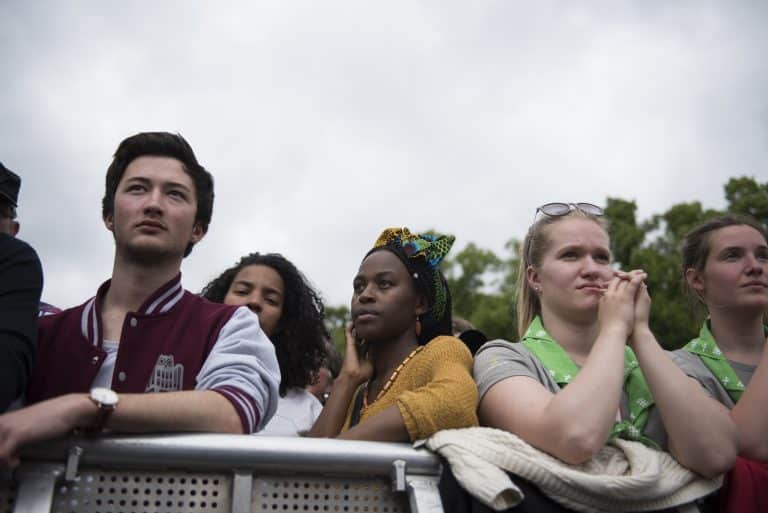
Image by Seffi Loos/Getty Images, © All Rights Reserved.
True Connection Requires Our Bodies and Our Minds
We had been friends for a few years before he shared his secret with me. Even though we were eating lunch at a noisy restaurant and it was unlikely that anyone was paying attention to our conversation, Peter lowered his voice and leaned in to whisper to me: “I am undocumented.” We had been talking about his lovely mother, who lived in his home country and about whom I had heard many stories. That day at lunch, Peter also told me that his mom had recently been diagnosed with a terminal illness.
Though Peter and his mother talked and corresponded often, he hadn’t seen her since he had left his home country 15 years prior. I had obliviously attributed this circumstance to a lack of travel funds, but now I understood that it was his immigration status that prevented his return home. Now more than ever, Peter desperately wanted to visit her, but he knew that if he left the U.S. he wouldn’t be allowed to return. Given his obligations to his young family in the U.S., Peter made the heart-breaking decision not to visit his dying mom.
While pursuing undergraduate and graduate degrees in sociology and psychology, I had read numerous books, taken a dozen courses, and written multiple research papers on issues related to immigration and global stratification. However, as a privileged U.S. citizen, I hadn’t personally experienced the trials of being undocumented or felt the frustration of geographic immobility while a loved one approached death in a far-off land. But through my friendship with Peter — getting to know his family in the U.S., listening to him share about the oppression he experienced on a daily basis, and seeing photographs of his life and family in his home country — I got a glimpse of a world that had previously eluded me, despite all of my studies.
In many ways, Peter’s life was marked by sorrow and loss — and that was more evident than ever during our lunch conversation that day. While listening to him talk about his mom, I felt an urge to travel to his home country to visit her on his behalf.
I couldn’t help but notice that such an urge was new to me; it violated my culturally conditioned individualistic American sensibilities. Why would I embark on a logistically complex and costly international journey for someone who wasn’t my significant other or related to me? Why did I care so much about the characters in a story that was so different from my own?
I’m no goody-goody, but I couldn’t shake the idea. In the course of being friends with Peter, I had begun to identify with him, his family, and his story. Once I saw the world from his perspective, my myopic, individualistic viewpoint was broadened to include his too.
And that changed everything — how I viewed myself, how I was willing to spend “my” money and time, and the extent to which I felt connected to people with perspectives, problems, and homelands that were nothing like my own.
Social psychologists have discovered that when we become close friends with people, we literally expand our sense of self to include them in it. As a result, we naturally incorporate their perspective into our perspective, their resources become our resources (and vice versa), their failures become our failures, and we take up their causes as if they were our own causes. In short, we identify with them and are changed as a result of relationship with them.
Though they weren’t formally educated in social psychology, the early Christian mystics understood that we are our best human selves when we are participating in mutual, interdependent relationship with people who are different from us. They used the term perichoresis to describe the nature of the relationship of the members of the Trinity — God the Creator, Christ the Liberator, and the Spirit the Comforter. Rather than simply hanging out as a threesome or collaborating with each other, perichoresis describes the mutual indwelling of the members of the Trinity. In other words, though each member is culturally distinct (e.g., they each have unique identities, perspectives, and experiences) each member’s self overlaps with the selves of the other members. In doing so, they influence each other and allow the other members to influence their interior experiences and identities.
The result is a cosmic cross-cultural relationship centered on mutual dependence. Indeed, the members are so interdependent that they cease to exist outside of relationship with each other. For example, God the Creator is self-actualized only because God is indwelled by Christ and the Spirit, and is open to being influenced by Christ’s and the Spirit’s distinct cultural realities. Outside of interdependent, cross-cultural relationship with Christ and the Spirit, God the Creator ceases to exist. Each of the individual members find and maintain their unique identities in the context of the mutually interdependent, culturally-diverse relationship of the Trinity.
Many religious streams, including the Christian tradition, purport that humans are made in the image of the Divine. If this is true, and if mutual indwelling is at the heart of the Divine, then humans are most able to participate in the divine when we participate in relationships that are also marked by mutual indwelling — that is, intimate cross-cultural relationships in which we vulnerably open ourselves to being influenced by people who are culturally different than us. However, our individualistic Western society often impedes these sorts of relationships.
So often, spiritually minded Westerners like myself who seek personal freedom and desire to do good in the world go about it in an individualistic way that is consistent with our cultural programming. We mistakenly believe that our individualistic spiritual path will lead to true enlightenment. We believe that our non-conscious racial biases will lessen if we just listen to enough podcasts about race. We believe that reading books about global inequality will absolve us of our responsibility as privileged Westerners. We believe that world peace will come if we just do lovingkindness meditation at the local sangha surrounded by people who are racially and economically similar to us.
Though helpful, these spiritual practices ultimately require very little of us and fall quite short of perichoresis.
In order to achieve true enlightenment and begin to participate in the healing of this broken and divided world, we must divest ourselves of our individualistic conditioning. This requires deep physical relationships with people who are different from us.
As someone who identifies with some privileged groups and tends to be individualistic, I have begun to think of cross-cultural relationships as a simple, costly, and transformational spiritual practice. This spiritual practice teaches me by requiring me to leave my cultural comfort zone, get outside of my academic and analytical head, open myself up to being impacted by someone else’s reality, alter my social geography, learn to embody (and not just talk about) practices of liberation and advocacy, and put my money and time where my mouth is.
This spiritual practice is simple but not for the faint of heart. It is through this practice that my privilege, internalized racism and colonialism, and attachment to comfort are brought to the surface and I am forced to reckon with them. We often idealize cross-cultural relationships, not recognizing ways in which privilege and power differences prevent us from truly connecting.
As I have pursued and sustained such relationships, I’ve needed to divest myself of privilege by confronting the paralyzing shame I feel when I encounter someone who is oppressed, learning to sit with the pain of my friends without trying to “fix it,” relinquishing my need to control the direction and pace of the relationship, and learning to lean into and ultimately embrace (rather than recoil from) the anger of people who are oppressed. Said differently, I’ve needed to participate in mutual indwelling, allowing myself to be transformed by being in interdependent relationship with people who are culturally different from me. It is through this process that I begin to participate in the collective liberation for which I long.
We are enfleshed spirits; our spirituality is rooted in our physical world. We are most human and most divine when we experience mutual and physical connections across cultural lines, in a way that costs us and changes us. Four months after my lunch conversation with Peter, I traveled to his home country to visit his mom. I carried his blessing as well as an armful of gifts that he had sent with me to give to his family. I was simply the messenger, but I knew that I had been invited into a sacred space — a space that continues to call me out of individualism and into freedom.


Share your reflection